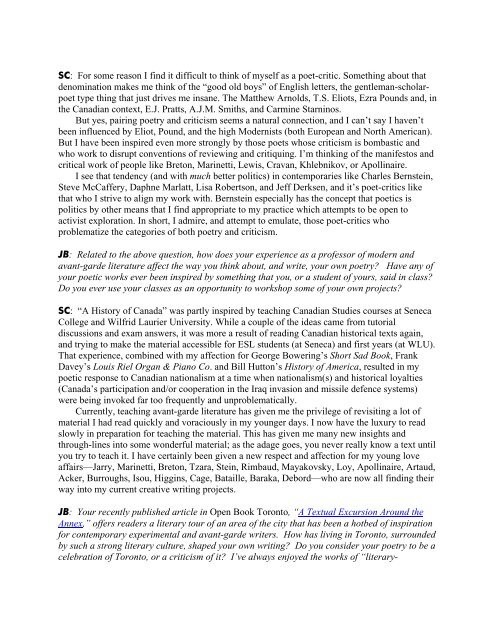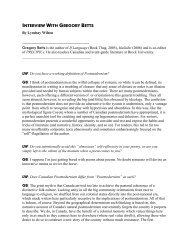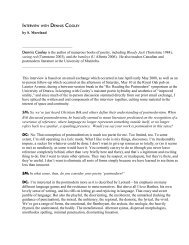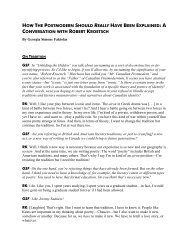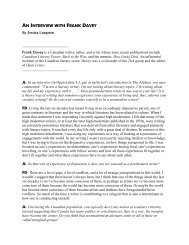Contemporary Postmodern Avant-Garde - The Canadian Literature ...
Contemporary Postmodern Avant-Garde - The Canadian Literature ...
Contemporary Postmodern Avant-Garde - The Canadian Literature ...
Create successful ePaper yourself
Turn your PDF publications into a flip-book with our unique Google optimized e-Paper software.
SC: For some reason I find it difficult to think of myself as a poet-critic. Something about that<br />
denomination makes me think of the “good old boys” of English letters, the gentleman-scholarpoet<br />
type thing that just drives me insane. <strong>The</strong> Matthew Arnolds, T.S. Eliots, Ezra Pounds and, in<br />
the <strong>Canadian</strong> context, E.J. Pratts, A.J.M. Smiths, and Carmine Starninos.<br />
But yes, pairing poetry and criticism seems a natural connection, and I can’t say I haven’t<br />
been influenced by Eliot, Pound, and the high Modernists (both European and North American).<br />
But I have been inspired even more strongly by those poets whose criticism is bombastic and<br />
who work to disrupt conventions of reviewing and critiquing. I’m thinking of the manifestos and<br />
critical work of people like Breton, Marinetti, Lewis, Cravan, Khlebnikov, or Apollinaire.<br />
I see that tendency (and with much better politics) in contemporaries like Charles Bernstein,<br />
Steve McCaffery, Daphne Marlatt, Lisa Robertson, and Jeff Derksen, and it’s poet-critics like<br />
that who I strive to align my work with. Bernstein especially has the concept that poetics is<br />
politics by other means that I find appropriate to my practice which attempts to be open to<br />
activist exploration. In short, I admire, and attempt to emulate, those poet-critics who<br />
problematize the categories of both poetry and criticism.<br />
JB: Related to the above question, how does your experience as a professor of modern and<br />
avant-garde literature affect the way you think about, and write, your own poetry? Have any of<br />
your poetic works ever been inspired by something that you, or a student of yours, said in class?<br />
Do you ever use your classes as an opportunity to workshop some of your own projects?<br />
SC: “A History of Canada” was partly inspired by teaching <strong>Canadian</strong> Studies courses at Seneca<br />
College and Wilfrid Laurier University. While a couple of the ideas came from tutorial<br />
discussions and exam answers, it was more a result of reading <strong>Canadian</strong> historical texts again,<br />
and trying to make the material accessible for ESL students (at Seneca) and first years (at WLU).<br />
That experience, combined with my affection for George Bowering’s Short Sad Book, Frank<br />
Davey’s Louis Riel Organ & Piano Co. and Bill Hutton’s History of America, resulted in my<br />
poetic response to <strong>Canadian</strong> nationalism at a time when nationalism(s) and historical loyalties<br />
(Canada’s participation and/or cooperation in the Iraq invasion and missile defence systems)<br />
were being invoked far too frequently and unproblematically.<br />
Currently, teaching avant-garde literature has given me the privilege of revisiting a lot of<br />
material I had read quickly and voraciously in my younger days. I now have the luxury to read<br />
slowly in preparation for teaching the material. This has given me many new insights and<br />
through-lines into some wonderful material; as the adage goes, you never really know a text until<br />
you try to teach it. I have certainly been given a new respect and affection for my young love<br />
affairs—Jarry, Marinetti, Breton, Tzara, Stein, Rimbaud, Mayakovsky, Loy, Apollinaire, Artaud,<br />
Acker, Burroughs, Isou, Higgins, Cage, Bataille, Baraka, Debord—who are now all finding their<br />
way into my current creative writing projects.<br />
JB: Your recently published article in Open Book Toronto, “A Textual Excursion Around the<br />
Annex,” offers readers a literary tour of an area of the city that has been a hotbed of inspiration<br />
for contemporary experimental and avant-garde writers. How has living in Toronto, surrounded<br />
by such a strong literary culture, shaped your own writing? Do you consider your poetry to be a<br />
celebration of Toronto, or a criticism of it? I’ve always enjoyed the works of “literary-


